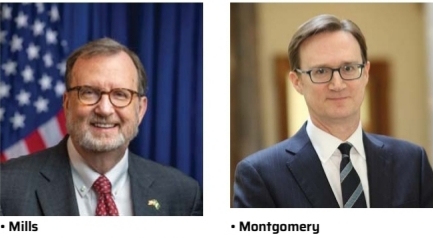- Warn of threats to free speech and investment
As Nigeria marked 26 years of uninterrupted democratic rule, five prominent foreign missions — the United States, United Kingdom, Finland, Norway, and Canada — jointly voiced serious concerns about the misuse of Nigeria’s Cybercrimes Act. In a strongly worded op-ed titled “Preventing Misuse of the Cybercrimes Act: Protecting Free Speech and Unlocking Economic Growth”, the envoys warned that the law is increasingly being used to suppress dissent, undermine press freedom, and stifle civic engagement.
The envoys — U.S. Ambassador Richard M. Mills Jr., UK High Commissioner Richard Montgomery, Finnish Ambassador Sanna Selin, Norwegian Ambassador Svein Baera, and Canadian High Commissioner Pasquale Salvaggio, argued that the Cybercrimes Act, while originally intended to combat online fraud and cyberterrorism, contains vague language that leaves it vulnerable to abuse by authorities. Dele Farotimi’s case highlights weaponisation of the law The diplomats cited the case of Nigerian author and activist Dele Farotimi as a “chilling example” of how the Act has been misused. Farotimi was reportedly arrested in Lagos, transferred across state lines to Ekiti State, and paraded in handcuffs for allegedly criticizing the judiciary in a book and podcast.

Though the charges were later dropped, his ordeal illustrates how the law is being used to silence critics, the envoys said. They further noted that Farotimi’s case is not isolated, pointing to a growing number of journalists, social media users, and activists facing similar charges for expressing opinions or exposing alleged corruption. A blow to democracy and digital growth According to the statement, the misuse of the Cybercrimes Act undermines President Bola Tinubu’s stated commitment to protecting democratic freedoms and fostering open debate. “Freedom of expression has long been a pillar of Nigeria’s democracy,” the envoys wrote, adding that “digital spaces must remain open for civic dialogue and accountability.”
They also expressed concern over the law’s impact on Nigeria’s economy. While the Nigerian Communications Commission (NCC) estimates annual losses of $500 million to cybercrime, the diplomats warned that overreach in enforcement could backfire by discouraging digital innovation and deterring foreign investment. “The law’s ambiguous definitions of ‘false information,’ ‘harassment,’ and ‘insult’ open the door for arbitrary interpretation, legal uncertainty, and human rights violations,” the statement read.
Calls for urgent legal reform The foreign missions echoed earlier concerns raised by Nigeria’s National Human Rights Commission (NHRC) and commended Minister of Information Mohammed Idris for indicating readiness to collaborate on a legislative review. However, they urged the National Assembly to treat the review as a matter of urgency. “We urge lawmakers to narrow the law’s definitions and prevent its use as a tool for censorship. The process must be transparent and open to public participation,” they emphasized. Global backing for reform Recognising the global challenge of regulating digital spaces, the envoys pointed to ongoing international support, including technical assistance through the Council of Europe’s Global Action on Cybercrime project.
“The time for reform is now,” the statement concluded. “Nigeria has the potential to become a leader in the digital economy — but that future depends on upholding freedom of expression and the rule of law. Nigerians, like people everywhere, deserve the right to speak freely — no matter how uncomfortable their message may be.”





